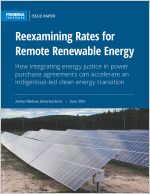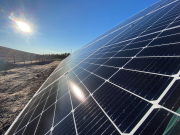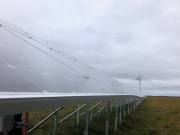For remote Indigenous communities, renewable energy projects can serve as a pathway towards economic development, climate action, energy security, and diesel reduction. Despite these myriad benefits, clean energy leaders in remote communities across Canada face persistent systemic roadblocks which indefinitely stall or halt renewable energy projects and aspirations.
One of these persistent barriers to renewable energy action is found at the intersection of power purchase agreements (PPAs) and regulator interpretations of the public interest.
Understanding PPAs and the public interest
Before renewable energy benefits can be realized by Indigenous communities, negotiations need to take place between energy sellers (in this case, Indigenous renewable energy proponents) and energy buyers (in this case, electric utilities). The contract stemming from this negotiation is called a power purchase agreement (PPA).
Through PPAs, Indigenous renewable energy proponents and utilities establish a price for energy that will be purchased from a renewable energy project over a specified period – usually 20 to 30 years. These PPAs are crucial because they generate income for Indigenous renewable energy proponents and lower the financial risk of building and owning a renewable energy project. Achieving favourable PPA contract terms, however, is a lengthy process and can be a persistent barrier to clean energy progress in remote communities. Due to a range of regulatory and legislative constraints, utilities are often limited to negotiating PPA rates at the “avoided cost of diesel”; meaning that utilities will purchase electricity from clean power projects solely based on what it would cost the utility to generate the same amount of electricity using diesel fuel, rather than renewable energy. Put differently, utilities are valuing energy provided from renewable technologies at the same rate as diesel – even though the costs and benefits of either are entirely different.
Due to a range of regulatory and legislative constraints, utilities are often limited to negotiating PPA rates at the “avoided cost of diesel”; meaning that utilities will purchase electricity from clean power projects solely based on what it would cost the utility to generate the same amount of electricity using diesel fuel, rather than renewable energy. Put differently, utilities are valuing energy provided from renewable technologies at the same rate as diesel – even though the costs and benefits of either are entirely different.

When PPA rates are set at the avoided cost, they disregard the social and environmental costs of diesel and ignore the myriad benefits of renewable energy. For Indigenous communities and clean energy proponents, these low rates mean they may not be able to guarantee enough revenue to secure financing. This inevitably has the impact of either stalling or blocking a renewable energy project, leaving a community stuck within the undesirable diesel-reliant status quo.
What’s motivating utilities to offer PPAs at low rates?
Due to the technical and logistical realities of the energy sector, utilities operate as monopolies. Because they experience no market competition, utilities are regulated by the government to ensure their business operations are conducted within the public interest. The way that regulators judge what is in the public interest has traditionally focused on reliability and economic efficiency. The consequence of this tight economic focus becomes apparent when Indigenous renewable energy proponents in remote communities begin PPA negotiations. In practice, this means that proponents are forced to contend with low PPA rates from highly cost-conscious utilities and the regulators’ traditional interpretation of the public interest backing them up. Given the changing nature of modern day social, economic, and environmental pressures, however, there is an imperative for these systems to evolve.
Today, the public recognizes the critical importance of both reconciliation with Indigenous Peoples and national climate action. Across a wide range of policy areas, these changing social and environmental priorities have initiated necessary government action and policy advancement. Regulator mandates, however, have remained largely unchanged and still focus primarily on economic considerations such as keeping utility costs down. For remote communities, this translates to decisions that limit utilities’ spending on PPA rates for the sake of the ‘public interest’, but at the expense of Indigenous and remote communities.
The concept of energy justice serves as a helpful challenge to this outdated status quo and introduces a more contemporary paradigm for governments, regulators, utilities, and Indigenous renewable energy project proponents to establish the public interest. Energy justice acknowledges that the harmful effects of energy development are largely borne by economically and socially marginalized groups, and it seeks pathways for addressing and remediating injustices.
Reconciliation with Indigenous Peoples, GHG emissions reductions, and community leadership are all values and goals that an energy justice framework reinforces. Through this lens, utilities could justify spending more money on remote communities through higher PPA rates and regulators could justify this increase in cost as within the public interest. This reinterpretation of the public interest to include energy justice allows all actors, including governments, utilities, and Indigenous clean energy proponents, to come together on terms reflecting Canada’s priorities of climate action and reconciliation.
How can we support Indigenous-led clean energy?
The power to create more just power purchase agreements between utilities and Indigenous clean energy proponents lies in the hands of government, regulators, and utilities.
- Provincial and territorial governments should refine the mandates of regulatory bodies overseeing utilities to emphasize that addressing climate change, advancing reconciliation, and promoting energy justice are all primary components of the public interest, along side providing secure and affordable energy.
- Regulators should evaluate whether the decision-making frameworks within their current mandate are leveraging an energy justice and climate-conscious lens, and also commit to considering reconciliation with Indigenous peoples as a component of the public interest.
- Utilities should work to offer PPA rates above the avoided cost of diesel for Indigenous-owned and -led renewable energy projects and support legislative and policy reform to justify offering higher PPA rates.
As the clean energy transition advances, reforming regulator mandates and supporting legislation is key and energy justice must be a central consideration. Utilities, regulators, and governments should work in collaboration with Indigenous communities to identify and remove the barriers to Indigenous-led energy development through higher PPA rates. Together, these efforts can contribute to a broader reframing of the interpretation of the public interest in energy regulation to include societal priorities such as equity, justice, climate action, and reconciliation.
 This blog is a condensed version of an issue paper written in June 2023. For more in depth analysis and recommendations, read the paper here.
This blog is a condensed version of an issue paper written in June 2023. For more in depth analysis and recommendations, read the paper here.











